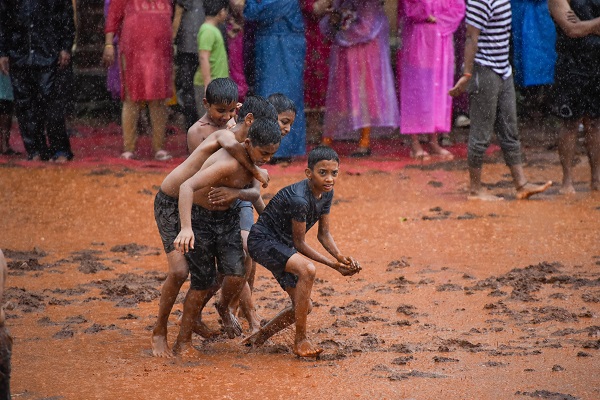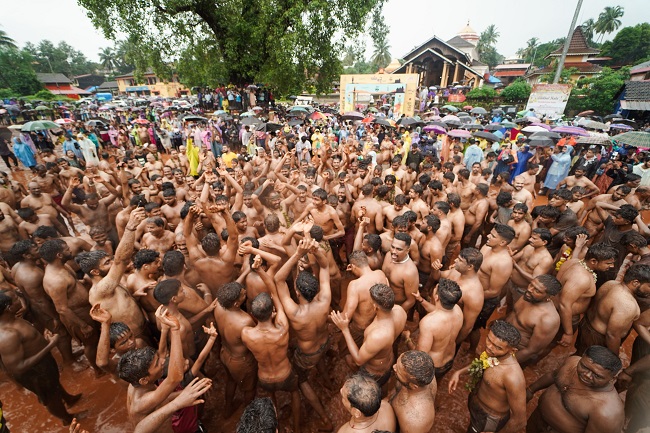As Goa’s skies open with the monsoon rains and the earth awakens, the village of Marcel responds with a cherished tradition: Chikhal Kalo. This deeply rooted festival, held annually at the sacred Sri Devki-Krishna Temple in Marcel, is more than just an event; it’s a vibrant, communal expression of gratitude to the Earth, a devotion to heritage, and a powerful symbol of unity. Set for July 7, 2025, this year’s Chikhal Kalo promises to once again transform the quiet village into a lively spectacle of celebration.


A Playful Homage to Childhood Krishna
Celebrated exclusively in this Ponda taluka village on the twelfth day of Ashadh (the fourth Hindu month), Chikhal Kalo is dedicated to Balkrishna, the endearing child form of Lord Krishna, renowned for his playful innocence. The festival’s name, literally translating to “mud play,” hints at its core, yet it encompasses far more than simple games. The day begins in the early hours with villagers gathering at the temple, offering blessings through devotional rituals and the rhythmic sounds of traditional Goan instruments. Following these invocations, the temple grounds become a sacred arena where participants joyfully immerse themselves in the fertile soil for spirited, traditional games.
These activities, from chendu fali (mud ball games) to khushti (wrestling bouts), re-enact tales from Lord Krishna’s childhood, reflecting his love for mischievous fun and his profound connection to the earth and its people. Beyond their religious symbolism, these games powerfully reaffirm the vital role of soil as a life-giver, deeply resonating with Goa’s agrarian heritage.
Unity in Play: The Dahi Handi and Communal Feasting
A highlight of Chikhal Kalo is the captivating Dahi Handi ceremony. In this time-honored tradition, teams form human pyramids to reach and break clay pots suspended high above the mud field, typically filled with curd, butter, or sweets. This event not only captures the jubilant spirit of Lord Krishna, famously fond of butter, but also beautifully embodies themes of collaboration, perseverance, and collective unity.
As villagers and visitors dive into the mud, devotional songs and rhythmic chants blend with the beating drums. A unique sight unfolds beneath the ancient peepal tree in the temple courtyard: devotees on a platform hurl puran polis, bananas, and ladoos into the muddy arena. The thrill of catching these sweets mid-air adds an extra layer of spontaneity and laughter to the day’s rituals.


The Heartbeat of the Festival: Music and Community
Music is the soul of Chikhal Kalo. From dawn until the rituals conclude, the air reverberates with the sounds of traditional percussion instruments like ghumot, shamel, and taal, echoing through the village as a spiritual call. The powerful chant of “Jai Hari Vitthal” surges through the crowd, invoking divine presence and anchoring the entire celebration in collective devotion. These melodies, passed down through generations, bind the community in rhythm, faith, and shared joy.
As cheers rise, drums beat, and pots shatter, a wave of communal joy washes over the grounds. It’s a moment of collective exaltation that unites all participants—villagers, tourists, children, and elders—in a shared spiritual and cultural experience.
Experience Goa’s Living Heritage
Visitors from across Goa, other Indian states, and even international tourists are warmly encouraged to participate or simply observe this unique festival. Whether you choose to jump into the mud or witness the celebration from the sidelines, the experience is deeply moving and unforgettable.
For cultural travelers, photographers, families, and students of history and anthropology, Chikhal Kalo offers a rare opportunity to witness a living tradition that beautifully intertwines ecology, mythology, and social unity. In a world increasingly disconnected from nature, Chikhal Kalo serves as a potent reminder of our bond with the Earth. It is a celebration of fertility, gratitude, and sustainable living, as much as it is about joyful play and deep piety. It underscores that the soil beneath our feet is not merely a resource, but a sacred link to life itself.
Join the Celebration: Goa Tourism’s Special Program
To further preserve and promote Goa’s intangible cultural heritage, the Department of Tourism, Government of Goa, is organizing a special two-day program for Chikhal Kalo 2025 on July 5th and 6th, leading up to the main event, also at the Sri Devki-Krishna Temple in Marcel. Visitors are heartily invited to join this vibrant celebration and experience Goa’s living traditions through devotional music, traditional games, and spirited community participation.
This unique blend of environmental mindfulness, spiritual depth, and unadulterated joy makes Chikhal Kalo one of the most meaningful and unforgettable festivals in the state. The Goa Tourism extends a warm invitation to all to witness and participate in Chikhal Kalo 2025. Come and discover a side of Goa that extends beyond its famous beaches—delve into its villages, its values, and its vibrant cultural soul.
Whether you’re a curious traveler, a culture enthusiast, or a spiritual seeker, Chikhal Kalo offers something rare: a celebration where the Earth itself is the stage, the people are the performers, and unity is the message.
Also Read
Travel Meet Asia 2025 to Boost Tourism
Watch on Youtube
